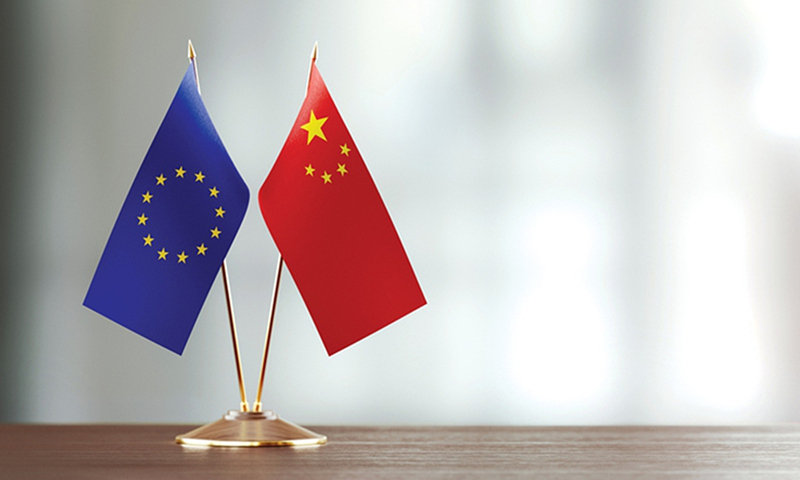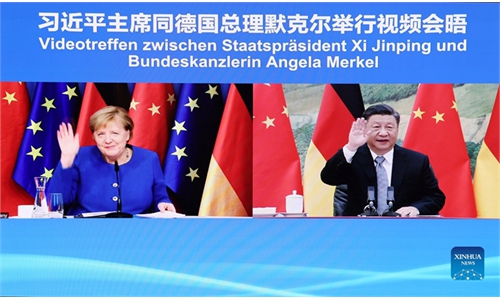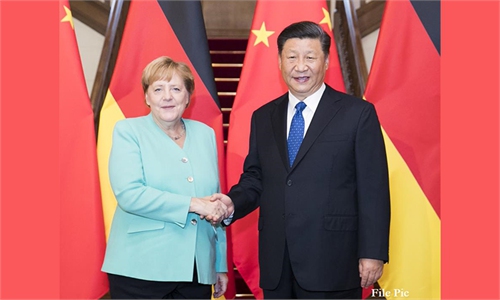Xi, EU’s Michel stress strategic independence in phone talk; EU 'never changed its policy on Taiwan island'

China-EU Photo: VCG
Chinese President Xi Jinping and European Council President Charles Michel spoke on the phone on Friday, and they stressed the significance of increasing the strategic independence. Michel noted that the EU's stance on the one-China policy has not changed and is willing to manage disputes with China.
The call came two days after Xi's video meeting with German Chancellor Angela Merkel had been viewed by some EU politicians and Chinese observers as a positive sign for bilateral relations amid strained ties.
Observers pointed out that China-EU relations are at a crossroads with many uncertainties, following the changes in the political situation in Germany after Merkel steps down and the US shoring up an alliance to compete with China. China and the EU are adjusting into the new situation and seeking ways to stabilize relations while controlling divergences.
Xi noted during the phone conversation that since the beginning of this year, there have been some new changes in the international situation, and China-EU relations also face new problems. China and the EU, as two great independent powers and comprehensive strategic partners, need to strengthen strategic communication to jointly promote bilateral ties for a healthy and stable development as they mutually benefit.
China and the EU are different in history and culture, social systems and development stage, and it is normal to see some competition, divergences and differences. They should be solved by talks. China has always been sincere in China-EU relations and will firmly safeguard the group's sovereignty, security and development interests, Xi said, noting that China hopes the EU adheres to strategic independence, tells right from wrong and works with China to promote bilateral ties.
Michel noted that the EU is willing to improve communications with China based on mutual respect and to manage disputes effectively. The EU insists on the one-China policy and has never changed its policy toward the island of Taiwan.
The recent development in the international situation has made the EU and its member states more aware of the importance of shoring up strategic independence. Although the political systems and development patterns are different, they both support multilateralism and need to cooperate to fight the coronavirus, promote economic recovery, deal with climate change and defend regional peace and stability, said Michel.
The EU will adhere to strategic independence to deal with international affairs and is willing to have close coordination with China on major international issues, he said.
The call between Xi and Michel on Friday was the first time for the two to speak directly since the end of last year with an array of interactions among senior officials from both sides exchanging views in the previous weeks.
China and EU have maintained high-level strategic communications and under current circumstance, the Xi-Michel call is more important and has more positive meaning, showing that the two sides are exchanging views on key issues and their divergences, Sun Keqin, a research fellow at the China Institutes of Contemporary International Relations, told the Global Times.
"Strategic independence" was mentioned several times during their conversation and some experts noted that it is a reminder from China and also from within the EU amid US efforts to create an anti-China alliance.
Calls for strategic independence from within the EU has grown louder especially after France recalled its ambassadors to the US and Australia after feeling "a stab in the back," as Canberra decided to scrap a submarine deal with Paris under the guise of AUKUS, a newly formed trilateral security partnership between the US, UK, and Australia.
China-US relations have influence on China-EU relations but they also have differences. The EU did not take China as a competitor and some EU politicians know that confrontation would only lead to a dead end, and shifting the focus from conflicts to cooperation is a smarter move, Cui Hongjian, director of the Department of European Studies at China Institute of International Studies, told the Global Times.
China-EU relations have witnessed a downward spiral in recent months after tit-for-tat sanctions. On March 22, the EU joined the US, the UK and Canada in announcing sanctions against Chinese officials for alleged human rights abuses in Xinjiang. China immediately announced countermeasures against 10 individuals and four entities, including several members of the European Parliament.
The European Parliament then formally froze the China-EU Comprehensive Agreement on Investment, citing Beijing's counter-sanctions. Chinese State Councilor and Foreign Minister Wang Yi criticized the EU for politicizing economic and trade issues but still sent a friendly message to the EU after the freeze, stressing that China always views the EU as a partner, not an adversary.
Divergence was also a key word in Xi and Michel's phone conversation on Friday, and experts said that talking about their differences may help each side understand their concerns and manage disputes.
Previously, some EU politicians were cited by media as saying that Michel was scheduled to discuss human rights topics on China's Xinjiang, Hong Kong and Taiwan with China.
Discussing human rights issues is EU's political insistence. It is common to have divergences but EU politicians should also be fully aware that only focusing on divergences brings no good to bilateral ties, Cui said.
He noted that China is not against talking about human rights but against using such topics to attack China or violate its core interests. Human rights should not be cards used to suppress other countries.
The China-EU Comprehensive Agreement on Investment is also a concern for China and the EU. Sun noted that EU leaders are aware that the agreement is mutually beneficial and would help boost EU economic recovery especially in the post-COVID-19 era. But the EU Parliament is abducting the bloc's benefits.
Although experts reached by the Global Times thought it is not possible to make a major breakthrough related to the China-EU Comprehensive Agreement on Investment, the Friday call is a good start for the two sides to work together in unclogging channels and seeking political chances to solve the problems.
The call came after an array of high-level interactions between China and the EU. For example, On September 28, Wang Yi and Josep Borrell, the EU's High Representative for Foreign Affairs and Security Policy, decided to strengthen coordination on the new round of high-level economic ties during the 11th round of high-level strategic dialogue between China and the EU.
Xi also met German Chancellor Angela Merkel by video link on Wednesday, during which Xi spoke highly of her contributions to promoting China-Germany and China-EU relations during her tenure, and noted China's doors are always open to Merkel as the Chinese people always value friendship and will never forget old friends.
Merkel is about to step down as chancellor after 16 years, making her the country's second-longest-serving chancellor and the first chancellor to leave power by choice.
Cui said it is rare to see the Chinese president speak highly of a Western leader in recent years, and such evaluation was based on the steady and sound development of China-Germany relations over the past 16 years.
It shows that China hopes Merkel's successor could follow in her footsteps and make continuous contributions to the stability of bilateral relations. The video call, an important stop in Merkel's farewell tour, could set a good example for leaders of other European countries, Cui told the Global Times.
As Chinese experts remain cautiously optimistic toward China-EU ties, they also pointed out possible factors that may hinder such relations.
China-Germany ties may experience a bumpy period, which may affect the EU's attitude toward China. The EU Parliament may continue to have a negative influence on bilateral ties for its anti-China moves and hyping of topics over China's Xinjiang, Hong Kong and Taiwan, Zhao Junjie, a research fellow at the Chinese Academy of Social Sciences' Institute of European Studies told the Global Times.
It may be harder for the EU to play the role in balancing China and the US since it may be forced to choose sides more frequently. It sometimes stands with the US - not to cooperate with the US to contain China, but with its own strategic interests.
The resurgence of populism in the EU as well as the increasing stress on ideology make it easier for the EU to seek an alliance on values with the US. Zhao said that more complexity and twists and turns may emerge in China-EU ties.




